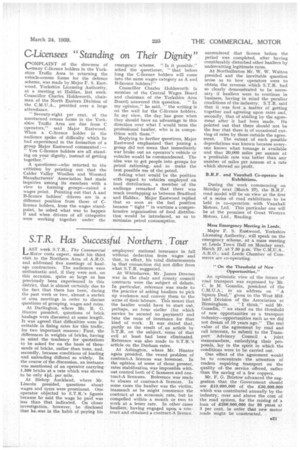S.T.R. Has Successful Northern Tour L AST week S.T.R., The Commercial LAST
Page 47

If you've noticed an error in this article please click here to report it so we can fix it.
costs expert, made his third visit to the Northern Area of A.R.O. and addressed five meetings of haulage contractors. The audiences were enthusiastic and, if they were not, on this occasion, quite so large as has previously been experienced in this district, that is almost certainly due to the fact that there has been, during the past week or two, almost a surfeit of area meetings in order to discuss questions of grouping, wages and rates.
At Darlington, where Mr. R. G. Hunter presided, cpiestions of brick haulage were discussed at some length. It was agreed that difficulties were inevitable in fixing rates for this traffic, for two important reasons : First, the differences in weights of bricks, having in mind the tendency for quotations to be asked for on the basis of thousands of bricks, rather than tons, and, secondly, because conditions of loading and unloading differed so widely. In the course of the discussion, an instance was mentioned of an operator carrying 1.500 bricks at a rate which was shown to be only 40. per mile.
At Bishop Auckland, where Mr. Lincoln presided, questions about wages and tyres were prominent. One operator objected to S.T.R.'s figures because he said the wage he paid was less than that indicated. On closer investigation, however, he disclosed that he .was in the habit of paying his employees' national insurance in full without deduction from wages and that, in effect, his total disbursements in that connection did not differ from what S.T.R. suggested.
At 'Whitehaven, Mr. James Downes was in the chair and county council contracts were the subject of debate. In particular, reference was made to the practice of asking hauliers to pick up workmen and convey them to the scene of their labours, This meant that the haulier would have to start out, perhaps, an hour earlier (for which service he secured no payment) and bear the onus of insurance for that kind of work. It was stated that, partly as the result of an article by S.T.R. on the subject, some of that evil at least had been eliminated. Reference was also made to S.T.R. 's article on the Durham rates.
At Ashington, where Mr. Hunter again presided, the vexed problem of contract-A licences was foremost. In the opinion of some of those present, rates stabilization was impossible without control both of C licensees and contract-A licensees. Reference was made to abuses of contract-A licences. In some cases the haulier was the victim, inasmuch as he might commence the contract at an economic rate, but be compelled within a month or two to work at a leseer rate. In other cases hauliers, having engaged upon a contract and obtained a contract-A licence, surrendered that licence before the period was completed, after having considerably disturbed other hauliers by undercutting legitimate rates.
At Northallerton Mr. W. W. Walton presided and the inevitable question arose as to how operators were to obtain the revenue which S.T.R. had so clearly demonstrated to be necessary if hauliers were to continue in business, having in mind the peculiar conditions of the industry. S.T.R. said that it was first a matter of getting together and agreeing upon rates and, secondly, that of abiding by the agreement after it had been made. He pointed out that there should not be the fear that there is of occasional cutting of rates by those outside the agree ment. The extent of such possible depredations was known because everyone knows what tonnage is available and that 20,000 miles per annum at a profitable rate was better than any number of miles per annum at a rate which showed no profit.
B.R.F. and Vauxhall Co-operate in Exhibitions.
During the week commencing on Monday next (March 27), the B.R.F. road model will be on view at the first of a series of road exhibitions to be held in co-operation with Vauxhall Motors, Ltd. This particular one will be at the premises of Great Western Motors, Ltd., Reading.
Mass Emergency Meeting in Leeds.
Major F. S. Eastwood, Yorkshire Licensing Authority, will speak on the emergency scheme, at a mass meeting at Leeds Town Hall on Monday next, March 27, at 7.30 p.m. The C.M.U.A., A.R.O., and Leeds Chamber of Commerce are co-operating.
"On the Threshold of New Opportunities."
An optimistic view of the future of road transport was expressed by Mr. C. le M. Gosselin. president of the C.M.U.A., in an address on "A Square Deal," given to the West Midland Division of the Association at
Birmingham. "I think," said Mr. Gosselin, "we stand on the threshold of new opportunities as a transport industry—opportunities such as we did not dream of 10 years ago." The real value of the agreement by road and rail interests, to submit to the Transport Advisory Council a joint memorandum, embodying their proposals, lay in the spirit in which the conditions were to be carried out.
One effect of the agreement would be to concentrate the attention of traders requiring transport on the quality of. the service offered, rather than the saving of a few coppers.
Mr. F. G. Bristow advanced the suggestion that the Government should use £10,000,000 of the £30,000,000 which was contributed annually by the industry, over and above the cost of the road system, for the raising of a Joan of £200,000,000 for 30 years at 3 per cent. in order that new motor roads might be constructed.




















































































